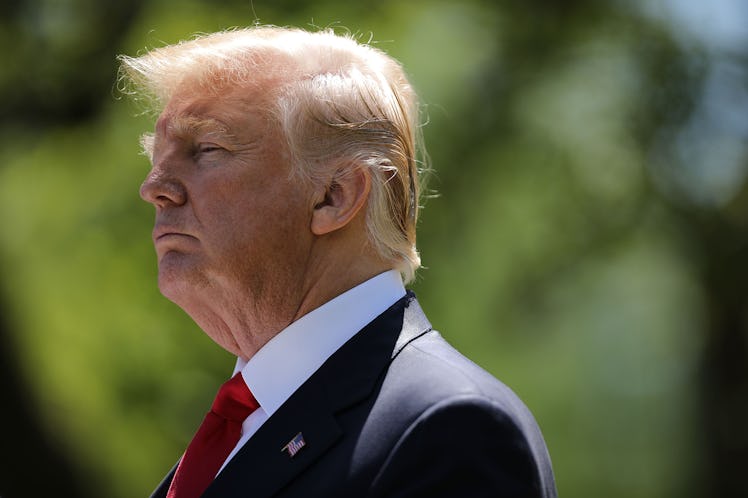
There's A Very Presidential Reason Why You Should Care About The 2018 Elections
Primary season is upon us, which means that the next few weeks will be crucial in determining who will be voted into office this November. The president, normally confident about his seat in power, is evidently getting pretty nervous about this election cycle. And there may be reason to worry. Donald Trump could be impeached if Democrats win the midterm elections, should they decide to pursue it.
The Trump administration seems acutely aware of this possibility. An unnamed source told The Hill that holding onto the GOP majority in Congress "is super important to the White House, and really the whole White House is very focused on it." The source also said that Trump plans to ramp up his campaigning efforts for midterm candidates during and after the congressional recess in August.
The king of confidence himself appears well aware of his political vulnerability. Whether out of fear or otherwise, he's already begun campaigning for his fellow GOP candidates and stoking voter energy with his base. In a visit to a key battleground area, Trump attended a rally in Michigan on Saturday, April 28 to tout economic vitality — while the rest of Washington was abuzz with the White House Correspondents' Dinner — and specifically cited the risk of impeachment should the Democrats win big in the midterms.
"We have to keep the House," Trump told the crowd in Michigan. "Because if you listen to [Democratic Rep.] Maxine Waters, she goes around saying, 'We will impeach him! We will impeach him!'" Waters has been repeatedly calling for Trump's impeachment for months.
While there are plenty of reasons Trump may want his fellow GOP members to be successful this election cycle — say, to have a better shot at passing legislation critical to his agenda, or even simple camaraderie — the reason he gave on Saturday had nothing to do with either. Rather, Trump's logic was self-protectionist: If Republicans lose control of Congress, I'm out.
Though he didn't sound too concerned, he didn't exactly sound comfy with the idea of Democrats foaming at the mouth to end his presidency.
"Historically, when you win the presidency, the party that wins does poorly in what we call the midterms," Trump said in Michigan Saturday. "We cannot be complacent. We gotta fight like hell and we gotta win the House and we gotta win the Senate."
And Trump is correct that, traditionally, midterm election years favor the party opposite the president. For presidents with below a 50-percent job approval rating, the party will lose an average of 36 seats in the House (they still lose an average of 14 even if they can maintain above that 50-percent threshold). Trump's approval rating, per FiveThirtyEight, has hovered around 40 percent.
Having a Democratic majority in both chambers of Congress is almost certainly necessary in order to carry out an impeachment process to fruition. The House is the chamber that has the power to bring an impeachment case before Congress, while the Senate is the one that tries that case. So as long as the GOP maintains majority control in one of these two chambers, chances are slim that any case would survive. (Barring any GOPers who dare to break ranks and vote for impeachment.)
A Quinnipiac Poll released on April 26 found that 71 percent of Democratic voters were in favor of beginning the impeachment process should their party retake the House this November.
Because several prominent Democrats have made it clear that they'd push for impeachment, if they secure a majority in Congress, chances increase that an impeachment would actually be successful. That's why this midterm election cycle is particularly high-stakes for members of the GOP. There are 435 House seats up for reelection and 35 seats up in the Senate, Democrats need to pick up just 32 House seats and two Senate seats to gain majority. (Remember that 36-seat rule based on presidential approval rating? Yeah. There's not much wiggle room.)
In the days following his Saturday speech, Trump proceeded to tweet repeatedly about the "witch hunt," referring to the investigation being led by FBI Special Counsel Robert Mueller, and denying any collusion or obstruction of justice.
(Over the course of the year so far, Trump had tweeted the phrase "witch hunt" 17 times; 36 times total since taking office.)
But while conceding the necessity of a high-stakes win, Trump tried to pivot back to his signature air of unshakeable confidence. "We gotta win the House," he said again on Saturday night. "And you know what? We're gonna win anyway."